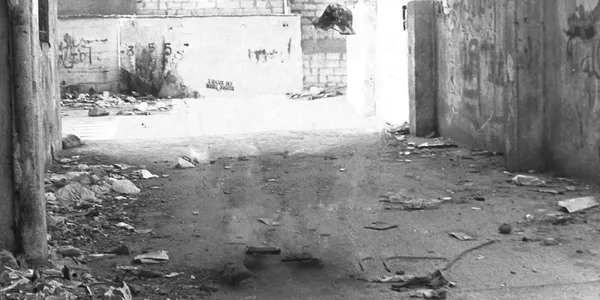Eye For Film >> Movies >> Erased, Ascent Of The Invisible (2018) Film Review
Erased, Ascent Of The Invisible
Reviewed by: Amber Wilkinson

The nature of erasure and memory rubs up against ideas of collective guilt in Ghassan Halwani's measured and moving documentary that considers the fate of those who 'disappeared' during the 15-year Lebanese Civil War. It's ironic that the full title is Erased, _____ Ascent Of The Invisible, the lines necessarily removed from review titles for indexing purposes, as reviewers like me are unsure how long that blank space should be. Official figures, issued in 2000, list the number of 'missing presumed dead' in the war as 2046 but unofficial estimates say the figure is more likely to be around the 17,000 mark.
Halwani uses a single image as the start of his investigation into the issue - a photograph that, at first glance, appears to be of an empty street. Closer inspection - something Halwani will invite us repeatedly to do during his trim 74-minute film - reveals traces of something in the vacant space at its heart. There's a hat in the air, signs of a shoe and, later, we're told that what appears to be a piece of graffiti on a wall in the background, is actually a slogan that once appeared on a T-shirt that Halwani has now removed in what he describes as "a dirty job of erasure".

He's not the first person to "dirtily" remove one of the men from the frame, however, as we soon learn this image once held the moment of his kidnap, witnessed by Halwani. Photojournalist Ramzi Haidar is torn by the photograph in ways that the documentarian goes on to suggest affect the whole populace. At first, looking at the doctored image, he says "I usually remember my photos" adding, "I wish you'd show me the original, it would put me at my ease." Once the truth is revealed, however, he is shocked and says he refuses to let anyone else see it because it has "implications", adding "the case has been closed".
Halwani suggests those that are missing will, regardless of attempted erasure, always be part of the fabric of Lebanon - an idea that takes physical form in shots showing him painstakingly chipping away at a wall in Beirut, peeling away layer upon layer of posters to reveal photos of the missing lying beneath. He also uses meticulous animation to recreate the faces of some of those who disappeared. The documentarian presents his argument largely by way of intertitles, noting that after once the film ends "these persons will plunge back into their state of invisibility", before adding "This will not prevent them from existing". Halwani takes this film further than remembrance, showing how official denial and a lack of collective closure for the nation has ramifications not only in terms of the impact of the families who are living but, in the long-term, for a society that will never be able to lay the past to rest so long as it refuses to class all those who are missing as dead.
Reviewed on: 22 Feb 2019















